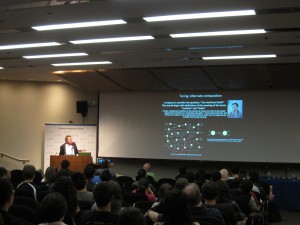-
Sans Forgetica: Could a font boost your studying?

An investigation into the effectiveness of Sans Forgetica, a font created to be intentionally difficult to read to engage readers and potentially improve recall ability.
-
Highlights of “Building Minds”

For those who missed “Building Minds: Microchips & Molecules”, here is a taste of the action. For all who packed the CNSI auditorium in May for our annual interdisciplinary symposium, here is a quick trip down memory lane. Enjoy! Gimzewski (’15 symposium) UCLA’s James Gimzewski cited Alan Turing in his talk describing his research on…
-
How do we see so many colors on a digital screen?

How can we possibly perceive a world of colors from just red, green, and blue, the colors of lights in TV, computer, and phone screens? The answer has to do with the way our visual system is set up: We have three different kinds of cones in the retina which respond most to what we…
-
Music Cognition
One of the most fascinating and quickly growing subareas of psychology and the cognitive sciences is music cognition, the interdisciplinary study of how the brain processes and perceives music. Music cognition is driven primarily by the perception of tempo and pitch, as well as the important concept of expectation.
-
Synesthesia: When Ordinary Activities Trigger Extraordinary Sensations
Many of us have had the experience of unusual associations between our senses and our memories. Perhaps a certain smell unexpectedly reminds you of a grandparent, or certain foods evoke memories of old friends. Associations between memories and sensory experience are normal, but about 4% of the population experiences a condition called synesthesia in which…
-
How do 3D movies work?
You might have heard that Avatar is responsible for a whole new kind of movie technology and that thousands of theaters had to be built or upgraded just to show these movies. What exactly are these technological miracles and if they’re so great, why do we still have to wear those silly glasses? First of…

